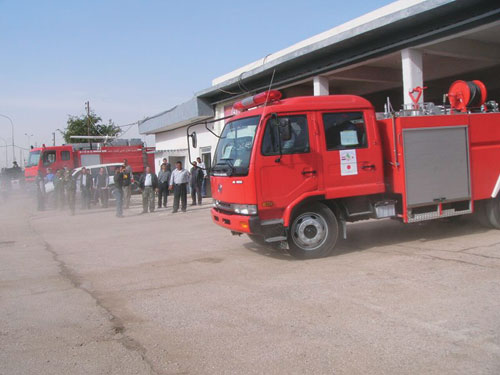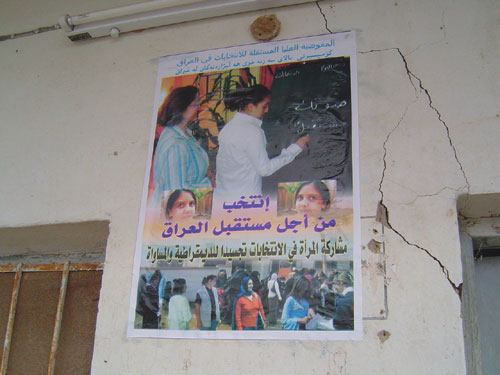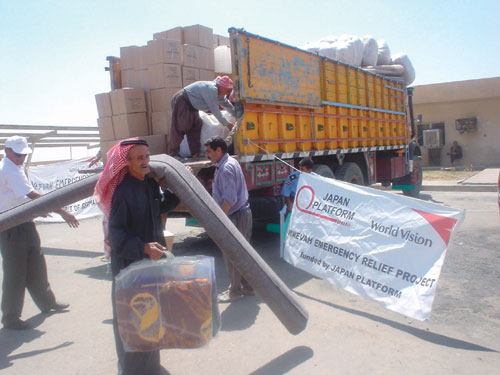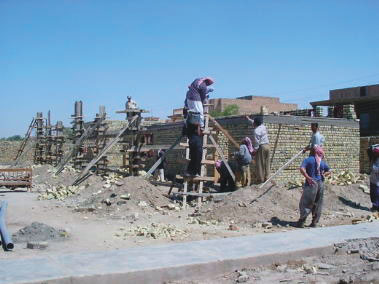Japan's Official Development Assistance White Paper 2005
Main Text > Part II ODA DISBURSEMENTS IN FISCAL YEAR 2004 > Chapter 2 Details and New Policies about Japan's ODA: Striving for Further ODA Reforms > Section 2. Measures for Each of the Priority Issues > 4. Peace-building > (1) Iraq
(1) Iraq
Japan and the rest of the international community must work together to overcome terrorism and assist the consolidation of peace and the nation re-building in Iraq so that Iraq may become a stabilizing force in the Middle East. It is extremely important not only for the people of Iraq, but also for the peace and stability of the Middle East and the international community that Iraq rebuild itself as a peaceful democratic country with ensuring its sovereignty, unity and territorial integrity. This is a matter of direct concern to the national interest of Japan, which relies on the Middle East for nearly 90% of its oil resources.
Japan has been assisting the reconstruction of Iraq in the forms of both providing ODA and dispatching Self-Defence Forces ( SDF ). Regarding ODA, Japan pledged at the International Conference on Reconstruction in Iraq held in Madrid in October 2003 to provide up to US$5 billion, including US$1.5 billion in grant aid for the time being, placing focus on rebuilding the foundations of the Iraqi people's livelihood in areas, such as power generation, education, water and sanitation, health care, employment, and public order. As for assistance for the medium-term reconstruction needs lasting until 2007 Japan pledged to provide a maximum of US$3.5 billion primarily through yen loans, focusing on infrastructure development in the aforementioned areas in addition to transport, etc. The provision of a total of US$1.5 billion in grant aid had been obligated by May 2005.
A. Bilateral Assistance
Japan's direct assistance to Iraq's government agencies has reached approximately US$900 million in total. In the beginning, Japan extended assistance mainly via international organizations, but began making concrete preparations for direct assistance through emergency grant aid upon the adoption of the UN Security Council Resolution 1511 in October 2003, determined that the Governing Council of Iraq, established in July 2003, would be the principal body of the Iraqi interim administration embodying sovereignty during the transitional period. In 2004, these direct assistance proposals were taken up consecutively.
For helping restore public order, Japan provided Iraq's Ministry of Interior with 1,144 police vehicles and 69 fire trucks, which are distributed throughout the country. Of these, 40 police vehicles and 6 fire trucks are deployed within the governorate of Al-Muthanna, mainly in Samawa.

Fire trucks provided to Iraq (Photo: Defense Agency)
Furthermore, Japan has extended emergency grant aid as follows;
[electricity] (Mobile Substation Facility Development Project, Samawa Large-scale Power Station Construction Project)
[water and sanitation] (Baghdad Water Purification Facility Development Project, Samawa Waste Disposal Equipment Development Project)
[health and medical care] (Project for the Development of 11 Main Hospitals (including the Samawa General Hospital), Project for Provision of Equipment to Primary Health Centers in the Governorate of Al-Muthanna)
[telecommunication] (North-South Core Communication Network Development Project, Out-of-town Telephone Exchange Equipment Development Project (Including Samawa)).
Regarding Iraq's debt issue, an agreement was concluded between the creditor countries and Iraq at the Paris Club in November 2004 to reduce Iraq's sovereign debt (a total of 80% cut over three phases). Based on this agreement, debt forgiveness negotiations between Iraq and Japan have been launched.
Capacity-building Assistance
Based on the perspective that human resource development is important in advancing steady reconstruction efforts, Japan has been assisting capacity building of Iraqi administrative officials and engineers in various areas through training projects. As of July 2005, approximately 900 Iraqis have received training in Japan or in Iraq's neighboring countries such as Egypt and Jordan.
Under cooperation with Egypt, for example, assistance was provided for the reconstruction of Iraq's medical sector, placing focus on personnel development for areas of high demand such as pediatric care. Training of a total of 447 Iraqi health care professionals took place over four sessions, in March and October 2004, and March and July 2005, at Cairo University and other medical institutions in Egypt. Third-country training was also held in Jordan to train a total of 275 relevant Iraqi personnel with the cooperation of related Jordanian institutions in areas of power generation, statistics, water resources, water supply and sewage systems, museum and ruins management, and ICT education. The training for museum and ruins management was implemented in cooperation with France, Germany and UNESCO.

Iraqi election poster with "Let's vote for Iraq's future. Women's participation in election in order to realize democracy and equality." written on it.
Assistance was also provided in the area of Iraq's political process through trainings in Japan. To assist the Iraqi Independent Elections Commission, the first training session 40 was held in December 2004 with the cooperation of the Kawasaki City Administration Commission and others, and the second session 41 was held in May 2005 with the cooperation of Okayama Prefectural Administration Commission and others. Furthermore, to support Iraq in the formulation of its constitution, Japan held a seminar to share its experiences and the issues it has overcome in its path toward becoming a democratic state, as well as basic principles behind the Japanese Constitution and the experiences of the Islamic countries in Asia, among other topics. The seminar was attended by a wide range of participants from each faction of the National Assembly of the Iraqi Transitional Government, including Assembly Speaker al-Hasani.
Assistance to the Governorate of Al-Muthanna
In the governorate of Al-Muthanna, the central city of which is Samawa where Japan's SDF is dispatched, the assistance through grassroots human security grant aid is implemented in coordination with the activities of SDF, in addition to the aforementioned assistance through emergency grant aid and NGOs. Through grassroots human security grant aid, for example, 6 water purification systems, 311 water feed and storage tanks, and 38 water tank trucks were provided. 3,000 tons of drinking water has been supplied per day and a total of 55 kilometres of residential roads has been repaired. Some typical examples of activities implemented in cooperation with SDF are that SDF medical officers instructed on the use of the medical equipment provided through ODA, and that the roads gravelled by SDF were paved with asphalt through ODA.
B. Assistance through NGOs
Japan also provides assistance through NGOs for humanitarian and reconstruction efforts in Iraq, the total of which is approximately US$25 million. In March 2004, ¥1.7 billion was extended to the Japan Platform exclusively for the purpose of supporting projects in Iraq. Projects that were implemented by NGOs under the umbrella of the Japan Platform since 2004 include emergency repair to medical care and educational facilities in the northern region of Iraq, emergency repair to elementary schools and sewerage systems in Baghdad, and the restoration of water and sanitation facilities of primary schools in Nineveh. In the governorate of Al-Muthanna, infant incubators and other medical equipment were provided to Samawa Children's and Obstetrics Hospital through Japan's NGO. In addition, Japan supports a French NGO, which rents water tank trucks to supply water to residents of regions who do not have access to water from water pipes.

Iraqi internally displaced persons ( IDPs ) receiving critical supplies (Photo: JPF/WVJ)
C. Promotion of International Cooperation and Assistance through International Organizations
Based on the perspective that the promotion of international cooperation is important in the reconstruction assistance to Iraq, Japan supports various reconstruction projects implemented by UN organizations and the World Bank by extending US$490 million 42 to the International Reconstruction Fund Facility for Iraq (hereinafter IRFFI), whose establishment was agreed upon at the abovementioned Madrid Conference. Some specific projects financed by Japan include UNDP projects to rehabilitate the National Dispatch Centre and four other power plants; UN-HABITAT projects to reconstruct educational facilities and to rebuild livelihood infrastructure and communities; cultural heritage management projects by UNESCO; and UNEP projects to develop human resources in the environment department of the Iraqi government and to conserve the environment of the marshlands in southern part of Iraq.
Chart 21. Japanese Assistance to Iraq Provided through the International Reconstruction Fund Facility for Iraq (IRFFI)

Chart 22. Japanese Assistance to Iraq


School reconstruction project through UN-HABITAT(Photo: UN-HABITAT)
Moreover, Japan, the largest contributor to the IRFFI, has served as the chair of its Donors' Committee. The third meeting of the Donors' Committee was held in Tokyo, October 2004, following the one in Abu Dhabi in February 2004, and second one in Doha in May 2004. Fifty-three countries and four organizations attended the expanded meeting on the first day of the Tokyo meeting. At the meeting, the Iraqi Interim Government announced its National Development Strategy for 2005 to 2007. Regarding economic development, it was confirmed that the assistance announced at the Madrid Conference must be implemented promptly by donor countries. Regarding political processes, the Iraqi Interim Government expressed strong determination to restore public order and hold a national election as planned. Furthermore, announcements were made that financial assistance would be provided to support the election, which was to be held in January 2005, including US$40 million from Japan.
Aside from the contribution to the IRFFI, Japan has extended approximately US$100 million via international organizations. Some specific projects include the Umm Qasr Port dredging project and emergency rehabilitation project of the National Dispatch Centre through UNDP; the school reconstruction project and community rebuilding project through UN-HABITAT; the Project for Reactivation of Primary Education in Iraq, which includes provision of school supplies and school restoration through UNICEF, and preservation and restoration of cultural heritage through UNESCO. Moreover, ODA also contributes to the creation of employment opportunities. In Al-Muthanna, nearly 600,000 working days were created as of June 2005 through UNDP's employment generation project, UN-HABITAT's school reconstruction project and housing project.
With the establishment of the Iraqi Transitional Government in April 2005, the Iraq International Conference was held in Brussels in June 2005 as a move to promote international cooperation. From Japan, Minister for Foreign Affairs Machimura attended the conference and co-chaired its Economic and Reconstruction Session. This conference was held to discuss political processes, economic issues and recovery, and public order and the rules of law. Following this conference, the Fourth Donors' Committee Meeting of IRFFI was held in Jordan in July 2005, with concrete discussions focused on the international efforts regarding reconstruction assistance. Japan will continue to put forth efforts in promoting international cooperation toward the reconstruction of Iraq.
D. Future Assistance
Although a transitional government was established in Iraq on April 28, 2005 as a result of the Iraqi National Assembly election held in January, the country's reconstruction process is still on the halfway. Regarding ODA, having obligated all of the initial US$1.5 billion of grant aid, Japan's assistance to Iraq's reconstruction is moving on to a phase of responding to the medium-term reconstruction needs primarily through yen loans of up to US$3.5 billion. The government of Japan has been engaged itself in talks with the Iraqi government concerning needs for assistance through yen loans. In order to prepare for an uninterrupted transition from the grant aid cooperation, at the same time, JICA, JBIC, and JETRO have been conducting various kinds of surveys and for projects finding. Moreover, rearing in mind close collaboration with its financial cooperation, Japan will also continue providing assistance for capacity building through training. Japan will continue to actively support the self-help efforts of the Iraqi people to rebuild their nation.


 Next Page
Next Page